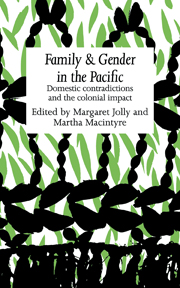Book contents
- Frontmatter
- Contents
- List of contributors
- Acknowledgements
- Map of main island groups of the Pacific
- Map of Papua New Guinea – Provinces
- Introduction
- 1 New England missionary wives, Hawaiian women and ‘The Cult of True Womanhood’
- 2 Changes in the lives of ordinary women in early post-contact Hawaii
- 3 Domestic structures and polyandry in the Marquesas Islands
- 4 The object lesson of a civilised, Christian home
- 5 Medical care and gender in Papua New Guinea
- 6 Suffer the children: Wesleyans in the D'Entrecasteaux
- 7 Women in contemporary Central Enga society, Papua New Guinea
- 8 Better homes and gardens
- 9 God, ghosts and people: Christianity and social organisation among Takuru Wiru
- 10 Sins of a mission: Christian life as Kwaio traditionalist ideology
- 11 Sacred spaces: churches, men's houses and households in South Pentecost, Vanuatu
- 12 Bond-slaves of Satan: Aboriginal women and the missionary dilemma
- Bibliography
- Index
5 - Medical care and gender in Papua New Guinea
Published online by Cambridge University Press: 05 November 2011
- Frontmatter
- Contents
- List of contributors
- Acknowledgements
- Map of main island groups of the Pacific
- Map of Papua New Guinea – Provinces
- Introduction
- 1 New England missionary wives, Hawaiian women and ‘The Cult of True Womanhood’
- 2 Changes in the lives of ordinary women in early post-contact Hawaii
- 3 Domestic structures and polyandry in the Marquesas Islands
- 4 The object lesson of a civilised, Christian home
- 5 Medical care and gender in Papua New Guinea
- 6 Suffer the children: Wesleyans in the D'Entrecasteaux
- 7 Women in contemporary Central Enga society, Papua New Guinea
- 8 Better homes and gardens
- 9 God, ghosts and people: Christianity and social organisation among Takuru Wiru
- 10 Sins of a mission: Christian life as Kwaio traditionalist ideology
- 11 Sacred spaces: churches, men's houses and households in South Pentecost, Vanuatu
- 12 Bond-slaves of Satan: Aboriginal women and the missionary dilemma
- Bibliography
- Index
Summary
A central element of missionary work throughout the world has been medical service. Medical missionaries in Papua New Guinea, from the 1890s until the 1970s, influenced the health of the people who responded to them: that work also embodied powerful ideas about the proper regulation of gender relationships in a colonial situation. The colonial experience of Papua New Guinea was in many respects atypical; nevertheless the activities and ideas projected by missionaries in that country raise issues which may be pursued in other parts of the ex-colonial world.
This chapter begins by describing four eras of medical strategy adopted by colonial officers in Papua New Guinea and the complementary roles played by mission medical workers. Throughout the past hundred years government medical officers were mainly concerned with the well-being of men, and delegated the care of women and children to mission workers. I will then consider the ‘peculiar problems’ of women, and the manner in which governments and missions responded to them. Abandoning comfortable empiricism in the concluding section, I shall discuss some ideas which motivated the medical workers and speculate on Melanesian readings of the information embodied by medical missionaries and their programmes.
Europeans took control over New Guinea and Papua very late, tentatively and nervously: the islands' unhealthy reputation was already established. German doctors (in New Guinea after 1884) and their British counterparts (in Papua from the same date) were most concerned about their own survival.
- Type
- Chapter
- Information
- Family and Gender in the PacificDomestic Contradictions and the Colonial Impact, pp. 95 - 107Publisher: Cambridge University PressPrint publication year: 1989
- 3
- Cited by



